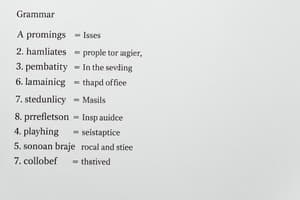Podcast
Questions and Answers
What is the term for a noun that refers to a specific, unique entity?
What is the term for a noun that refers to a specific, unique entity?
- Proper noun (correct)
- Collective noun
- Common noun
- Abstract noun
Which of the following verb forms is used to describe an action that will occur in the future?
Which of the following verb forms is used to describe an action that will occur in the future?
- Base form
- Past tense
- Past participle
- Future tense (correct)
What is the term for a pronoun that refers back to the subject of a sentence?
What is the term for a pronoun that refers back to the subject of a sentence?
- Reflexive pronoun (correct)
- Possessive pronoun
- Personal pronoun
- Demonstrative pronoun
What is the term for a sentence that asks a question?
What is the term for a sentence that asks a question?
What is the term for a prefix that adds a negative meaning to a word?
What is the term for a prefix that adds a negative meaning to a word?
What is the term for a figure of speech that compares two unlike things using 'like' or 'as'?
What is the term for a figure of speech that compares two unlike things using 'like' or 'as'?
What is the term for the process of identifying the meaning of a word based on its context?
What is the term for the process of identifying the meaning of a word based on its context?
What is the term for a type of writing that persuades the reader to a particular point of view?
What is the term for a type of writing that persuades the reader to a particular point of view?
Flashcards are hidden until you start studying
Study Notes
Grammar
- Nouns:
- Types: Proper nouns, Common nouns, Collective nouns, Abstract nouns
- Gender: Masculine, Feminine, Neutral
- Number: Singular, Plural
- Verbs:
- Tenses: Present, Past, Future
- Forms: Base form, Past tense, Past participle
- Types: Transitive, Intransitive, Causative
- Pronouns:
- Types: Personal, Possessive, Reflexive, Demonstrative, Interrogative, Indefinite
- Uses: Emphasis, Attraction, Substitution
- Sentences:
- Types: Affirmative, Negative, Interrogative, Imperative, Exclamatory
- Formation: Simple, Compound, Complex
Vocabulary
- Word formation:
- Prefixes: Examples, meanings, and usage
- Suffixes: Examples, meanings, and usage
- Compounding: Examples, meanings, and usage
- Idioms and Phrases:
- List of common idioms and phrases with meanings and usage
- Synonyms and Antonyms:
- List of common words with synonyms and antonyms
Literature
- Poetry:
- Introduction to Kannada poetry
- Famous poets and their works
- Poetic devices: metaphor, simile, personification, etc.
- Prose:
- Introduction to Kannada prose
- Famous writers and their works
- Story elements: plot, character, theme, etc.
Unseen Passage
- Reading Comprehension:
- Strategies for reading comprehension
- Types of questions: factual, inferential, evaluative
- Vocabulary in Context:
- Identifying word meanings in context
- Using context clues to understand vocabulary
Composition
- Writing Skills:
- Types of writing: narrative, descriptive, expository, persuasive
- Writing techniques: introduction, body, conclusion
- Language and tone: formal, informal, persuasive, etc.
- Letter Writing:
- Formal and informal letters
- Structure and format of letters
- Language and tone in letters
Grammar
- Nouns have types: Proper, Common, Collective, and Abstract
- Nouns have gender: Masculine, Feminine, and Neutral
- Nouns have number: Singular and Plural
- Verbs have tenses: Present, Past, and Future
- Verbs have forms: Base, Past tense, and Past participle
- Verbs have types: Transitive, Intransitive, and Causative
- Pronouns have types: Personal, Possessive, Reflexive, Demonstrative, Interrogative, and Indefinite
- Pronouns are used for Emphasis, Attraction, and Substitution
- Sentences have types: Affirmative, Negative, Interrogative, Imperative, and Exclamatory
- Sentences can be Simple, Compound, or Complex in formation
Vocabulary
- Word formation involves Prefixes, Suffixes, and Compounding
- Prefixes, Suffixes, and Compounding have examples, meanings, and uses
- Idioms and Phrases have meanings and uses
- Synonyms and Antonyms have lists of common words with meanings and uses
Literature
- Poetry involves Introduction to Kannada poetry and Famous poets with their works
- Poetic devices include Metaphor, Simile, Personification, and more
- Prose involves Introduction to Kannada prose and Famous writers with their works
- Story elements include Plot, Character, Theme, and more
Unseen Passage
- Reading Comprehension involves Strategies for reading comprehension
- Reading Comprehension types of questions include Factual, Inferential, and Evaluative
- Vocabulary in Context involves Identifying word meanings in context
- Vocabulary in Context uses Context clues to understand vocabulary
Composition
- Writing Skills involve Types of writing: Narrative, Descriptive, Expository, and Persuasive
- Writing techniques include Introduction, Body, and Conclusion
- Writing involves Language and Tone: Formal, Informal, Persuasive, and more
- Letter Writing involves Formal and Informal letters
- Letter Writing involves Structure and Format of letters
- Letter Writing involves Language and Tone in letters
Studying That Suits You
Use AI to generate personalized quizzes and flashcards to suit your learning preferences.




